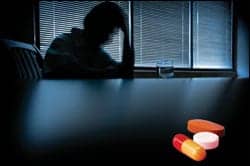Depression can be seemingly inescapable, impacting patients by day and night. By day, patients struggle with depressed mood and loss of interest or pleasure among other symptoms. By night, patients often face insomnia. The battle with insomnia may mean that patients have difficulty falling asleep initially, difficulty getting back to sleep after early morning awakenings, or both.1 Differences may also be seen in the quality of sleep itself. Classic sleep study findings in depression that have sparked much debate and controversy in the sleep medicine community over the past several decades are a decreased latency in entering rapid eye movement (REM) sleep, an increased amount of REM sleep, and an increase in the amount of rapid eye movements seen per minute, or phasic density, of REM sleep.2 Once these symptoms are effectively treated, the patients may still have a persisting reduction in the latency to enter REM sleep for up to 6 weeks following recovery.3 Thus, some authors have concluded that these changes in REM sleep may represent trait markers that indicate a vulnerability for the development of a depressive illness.4 Further, a decreased REM latency in family members of a patient may increase that patient’s risk of depression threefold.1
So, if depressed patients go into REM earlier, get more REM, and have a higher power of REM (increased phasic density), then does that mean that REM causes depression? Restricting oneself to a cursory examination of the subject may lead one to believe this idea. In fact, the changes in sleep that can be seen with use of some of the older antidepressant medications initially seemed to support it. Some of the effective antidepressants have been shown to prolong the latency to enter REM sleep and decrease total REM sleep amount.5
|
Search Sleep Review’s online archives for more information on sleep and depression.
|
However, not all antidepressant medications produce a clear suppression of REM sleep. Responders to the tricyclic antidepressant desipramine (Norpramin and Pertofrane) may actually show more REM sleep than nonresponders.5 Nefazodone (Serzone) and bupropion (Wellbutrin, Zyban, Budeprion, and Buproban) have both been documented to increase REM sleep.6 Contrary to older theories, these findings suggest that an antidepressant medication’s ability to decrease REM is not a prerequisite for its clinical antidepressant efficacy.1 Further, the polysomnographic finding of a reduced latency to enter REM sleep may be relatively nonspecific for a diagnosis of depression, as it may also be seen in narcolepsy, chronic sleep deprivation, or recent withdrawal of a REM-suppressing medication or alcohol.
Sleep and mood
Suicidality can be a dangerous side to depression. Is there a difference in sleep for depressed patients who are contemplating suicide? In one study, researchers interviewed 165 patients aged 18 to 68 years with the Suicide Assessment Scale after a suicide attempt. The researchers concluded that frequent nightmares were associated with a fivefold increase in risk for a high suicidality score.7
As it has not been definitively demonstrated that decreased REM latency and increased REM are the cause of clinical depression, another consideration is that perhaps the brain is somehow attempting to repair itself through REM sleep.
Insomnia and drug Treatment for Depression
Insomnia is a frequent symptom of depression. Although never approved by the US Food and Drug Administration (FDA) for the treatment of insomnia, the older antidepressant medication trazodone (Desyrel) is one of the most widely prescribed medications for the treatment of insomnia. Trazodone can improve sleep continuity, but common side effects are next-day cognitive impairment, dry mouth, blurred vision, constipation, and urinary retention. Prolongation of the QT interval on an electrocardiogram (ECG) and a lowering of the seizure threshold are other concerns. Medications in this class tend to have strong effects on sleep maintenance, but are also prone to elicit complaints of daytime sedation.8
A complicating factor in the treatment of depression is that antidepressant medications such as fluoxetine (Prozac) and other serotonin selective reuptake inhibitors (SSRIs) may disrupt sleep and worsen insomnia. Sleep improvement early in the treatment of depression should be a clinical goal.9 Ideally, an effective antidepressant would result in normalization of disturbed sleep in concert with resolution of the depressive symptoms. Recent research studies in this field have looked at combining SSRI medications with nonbenzodiazepine hypnotic medications such as zolpidem (Ambien) and eszopiclone (Lunesta).
Combination Drug Therapy
Of the recent research, two studies looked at safety in combining SSRI medications with nonbenzodiazepine hypnotic medications. One study looked at using a combination of zolpidem and fluoxetine; 29 healthy female volunteers received both zolpidem (10 mg) and fluoxetine (20 mg). Both zolpidem and fluoxetine were well tolerated alone or during coadministration. The authors concluded that there were no significant pharmacokinetic or pharmacodynamic interactions between the medications and that short-term cotherapy with fluoxetine and zolpidem appears safe.10 The second study looked at this using a combination of zolpidem and sertraline (Zoloft). The study of 28 healthy female volunteers determined that when compared to zolpidem alone, the presence of sertraline can slightly increase the serum concentration of zolpidem. Despite this, there were no next-day effects of zolpidem on the Digit Symbol Substitution Test, and both drugs were well tolerated. The authors concluded that coadministration of sertraline 50 mg and zolpidem 10 mg appears to be safe in healthy females but could result in a shortened onset of action and increased effect of zolpidem.11
Safety is one thing, but do patients who are treated with such a combination improve clinically? There were 40 men and 150 women with a combined diagnosis of DSM-IV major depressive disorder and persistent insomnia in the presence of effective and stable treatment with fluoxetine (£ 40 mg/day), sertraline (£ 100 mg/day), or paroxetine (Paxil) (£ 40 mg/day) who participated in a randomized, double-blind, parallel-group study. Patients received either placebo or zolpidem, 10 mg nightly, for 4 weeks and single-blind placebo for 1 week thereafter. Compared with placebo, zolpidem was associated with improved sleep as measured by longer sleep times, greater sleep quality, and reduced number of awakenings. Patients also reported feeling significantly more refreshed, less sleepy, and more able to concentrate. After placebo substitution, there was no evidence of dependence or withdrawal from zolpidem (DSM-IV criteria). The authors concluded that in this defined patient population, zolpidem, 10 mg, was effectively and safely coadministered with an SSRI, resulting in improved self-rated sleep, daytime functioning, and well-being.12
A larger 8-week study of 545 patients who met DSM-IV criteria for both depression and insomnia compared the effect of treating patients with a combination of eszopiclone and fluoxetine versus treating them with fluoxetine alone. Primary endpoints were the Hamilton Rating Scale for Depression (HAM-D-17) and the Clinical Global Impression Improvement (CGI-I) and Severity items (CGI-S). Patients treated with both eszopiclone and fluoxetine had significantly decreased sleep latency and wake time after sleep onset, and increased total sleep time, sleep quality, and depth of sleep at all double-blind time points. Eszopiclone cotherapy also resulted in: significantly greater changes in HAM-D-17 scores at Week 4 (P = .01) with progressive improvement at Week 8 (P = .002); significantly improved CGI-I and CGI-S scores at all time points beyond Week 1 (P < .05); and significantly more responders (59% vs 48%; P = .009) and remitters (42% vs 33%; P = .03) at Week 8. Treatment was well tolerated, with similar adverse event and dropout rates. The authors concluded that cotherapy with eszopiclone and fluoxetine was relatively well tolerated and associated with rapid, substantial, and sustained sleep improvement, a faster onset of antidepressant response on the basis of CGI, and a greater magnitude of the antidepressant effect.13
Considering the findings of these studies, it may be time to rethink how we treat patients who have a combined diagnosis of depression and insomnia. The right drug therapy approach could offer sweet dreams for both patients and their treating physicians.
Timothy J. Walter, MD, DABSM, and Uma Marar, MD, DABSM, are sleep medicine physicians operating the American Academy of Sleep Medicine-accredited practice Capitol Sleep Medicine in Grove City, Ohio. They can be contacted at [email protected]. This article was not funded by any pharmaceutical company.
References
- Sharpley AL, Cowen PJ. Effect of pharmacologic treatments on the sleep of depressed patients. Biol Psychiatry. 1995;37(2):85-98.
- Benca RM, Obermeyer WH, Thisted RA, Gillin JC. Sleep and psychiatric disorders. A meta-analysis. Arch Gen Psychiatry. 1992;49:651-668.
- Rush AJ, Erman MK, Giles DE, et al. Polysomnographic findings in recently drug-free and clinically remitted depressed patients. Arch Gen Psychiatry. 1986;43:878-884.
- Kupfer DJ. Neurophysiological “markers”—EEG sleep measures. J Psychiatr Res. 1984;18:467-475.
- Vogel GW, Buffenstein A, Minter K, Hennessey A. Drug effects on REM sleep and on endogenous depression. Neurosci Biobehav Rev. 1990;14(1):49-63.
- Nofzinger EA, Reynolds CF, Thase ME, et al. REM sleep enhancement by bupropion in depressed men. Am J Psychiatry. 1995;152(2):274-6.
- 11th European Symposium on Suicide and Suicidal Behaviour. Psychiatr Danub. 2006;18(suppl 1):85.
- Thase ME. Depression and sleep: pathophysiology and treatment. Dialogues Clin Neurosci. 2006;8(2):217-226.
- Wilson S, Argyropoulos S. Antidepressants and sleep: a qualitative review of the literature. Drugs. 2005;65(7):927-947.
- Allard S, Sainati S, Roth-Schechter B, MacIntyre J. Minimal interaction between fluoxetine and multiple-dose zolpidem in healthy women. Drug Metab Dispos. 1998;26:617-622.
- Allard S, Sainati SM, Roth-Schechter BF. Coadministration of short-term zolpidem with sertraline in healthy women. J Clin Pharmacol. 1999;39:184-191.
- Asnis GM, Chakraburtty A, DuBoff EA, et al. Zolpidem for persistent insomnia in SSRI-treated depressed patients. J Clin Psychiatry. 1999;60:668-676.
- Fava M, McCall WV, Krystal A, et al. Eszopiclone co-administered with fluoxetine in patients with insomnia coexisting with major depressive disorder. Biol Psychiatry. 2006;59:1052-1060.






